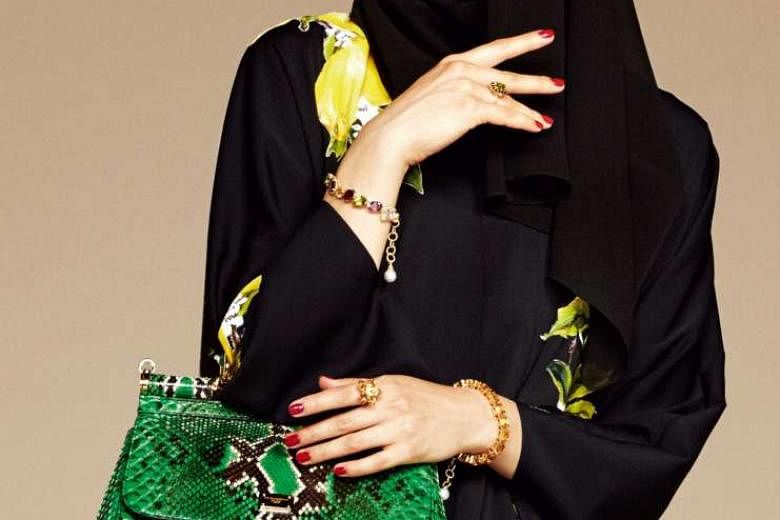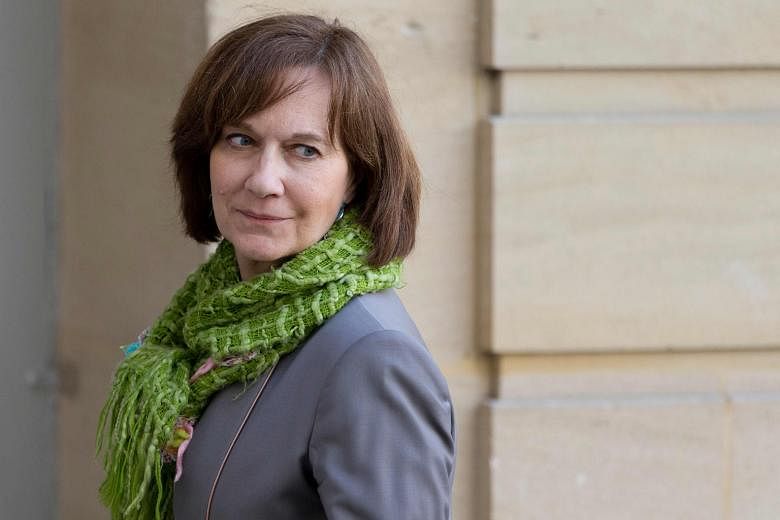When terrorist attacks are claimed by radical Islamist groups, by the Islamic State in Iraq and Syria or attributed to deranged individuals with questionable links to Islam, ensuing political debates often focus on those who display the most visible signs of Islam - veiled Muslim women.
Curiously, some politicians appear to think that one of the most effective strategies for combating violent extremism, radicalisation and Islamism is to regulate Muslim women's dress. The dubious link between terrorism and Muslim women's clothing surfaced most recently in declarations made by Ms Laurence Rossignol, France's minister for women's rights.
Commenting on Western fashion houses that produce lines of clothing for observant Muslim women, Ms Rossignol berated them for being "irresponsible" and encouraging "the imprisonment of women's bodies".
She denied the possibility that some Muslim women may choose to wear headscarves or face veils, asserting that such women are like "American Negres who supported slavery".
Despite the outrage that her remarks elicited and the petitions on social media calling for her to resign, Ms Rossignol did not retract her statements about Muslim women. Ms Rossignol's comments do not mention terrorism or radicalisation directly. However, her comments surface, like many others before her, in the aftermath of terrorist attacks in Europe and, in this case, soon after the March 22 Brussels bombing and last year's explosions in Paris. There is no question that terrorism is unacceptable and that national security must be protected.

Yet, continuing to respond to terrorism with a concern over Muslim women's dress is a convenient way to ignore the genuine problems facing us today, namely that terrorism has become an intrinsic problem of our global world, that radicalisation is occurring from within our allegedly modern, democratic and free societies, that violent acts are committed by citizens of Euro-American and Australian nations, and not by migrants or foreigners, and that nothing in Islam as a faith calls for violence or extremism.

If there are concerns about terrorism and national security, they have nothing to do with Muslim women or their clothing.
It is time to change the narrative about Muslim women's identities and to stop defining them exclusively by their clothing.
While some Muslim women are indeed forced to dress in conservative ways by their fathers, brothers, husbands or by governments espousing conservative interpretations of Islam, they are the minority among all Muslims. In the majority of the world, Muslim women choose what they want to wear.
The infinite reasons why Muslim women veil beseech us to recognise the fact that personal choice plays a greater role than we might have anticipated in any woman's adoption of a particular attire.
But the notion of choice must be qualified. Choice is commonly associated with a Western style of individualism that stems from the tradition of political liberalism.
Yet, choice is not universally just about individual desires.
Choice should be understood with cross-cultural sensitivity.
In some societies, it can imply allegiance to a larger community.
In these cases, choice is not about doing what one wants, independently of the group, but it means adopting what is best for the group. Wishing to affiliate oneself with one's community through veiling thus does not mean necessarily that it is a coercive imposition or a sign of fanaticism, but rather that it may be a well-considered, voluntarily chosen act of piety, ethics or political assertion.
The rise in the number of Muslim women worldwide who cover their hair and/or face is due to a number of factors, not least of which is the rapid development and success of the Islamic fashion industry.
The growing appeal of Islamic fashion among Muslim women may be partly due to the fact that these clothes challenge conservative Islamist views of appropriate Muslim women's dress, and the strict governmental regulations imposed on women's attire in some Muslim-majority countries.
Islamic fashion functions at times as a revolutionary type of fashion, one that claims to endorse women's individuality and protect their human right to choose.
France, recognising the privileged place it occupies in the imagination of many Middle Eastern women, has become a business leader in catering to affluent Muslim women.
French luxury fashion designers, especially Dior, have been entrepreneurial in ensuring that they maintain and augment the 30 per cent of the luxury business they already have in Muslim-majority societies.
According to the 2015-2016 State of the Global Islamic Economy Report, Muslim consumers spend an estimated US$230 billion (S$310 billion) on clothing, a number that is projected to grow to US$327 billion by 2019, larger than the current combined clothing markets of Britain (US$107 billion), Germany (US$99 billion) and India (US$96 billion).
For years, designers have pursued marketing strategies to sell haute couture scarves, dresses, more modest versions of their catwalk styles and make-up to rich Muslim women.
The current trend by a wider range of Western designers - H&M, Mango, Marks & Spencer, and Dolce & Gabbana - to cater to conservative Muslim-style attire is just an expansion of practices that have been going on for some 20 years, albeit in more secretive, non-advertised events.
Ms Rossignol's concern over Western designers' lines of Muslim-style dress must be reconsidered in this light because it is discounting the very real complicity of European governments that want to be recognised as beacons of individual freedoms and of women's human rights on one hand, and at the same time seek to further their markets in some of the most repressive regimes in the world towards women. Hijab and niqab may be challenges to French secularism and European ideas of human rights, but they also represent an economic boon that Europe is keen to preserve.
Not least, Ms Rossignol's claim - that Muslim women who choose to dress in conservative outfits are like the Negroes who accepted slavery - silences the ethical and moral agency of Muslim women and their right over their own body.
As minister for women's rights, Ms Rossignol has a duty to recognise that it is impossible to know the depth of a Muslim woman's piety or fanaticism, the extent of her feminism or conservatism, and the degree of her liberation and oppression based on clothing alone.
- Professor Sahar Amer is Chair of the Department of Arabic Language and Cultures, The University of Sydney. She is a panellist at an April 28 conference, Islam in the Contemporary World, organised by the S. Rajaratnam School of International Studies, Nanyang Technological University.


